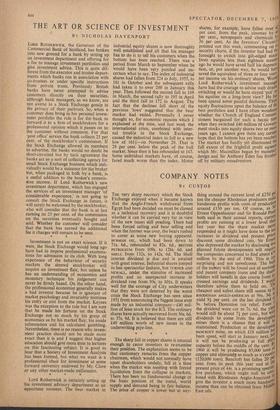THE ART OR SCIENCE OF INVESTMENT
BY NICHOLAS
DAVENPORT
LORD ROTHERWICIC, the Governor of the Commercial Bank of Scotland, has broken into new ground for a bank by setting up an investment department and offering for a fee to manage investment portfolios and give investment advice. This is quite dif- ferent from the executor and trustee depart- ments which banks run in association with co-trustees or under specific instructions from private trusts. Previously British banks have never attempted to advise customers directly on their securities, although bank managers; as we know, are not averse to a Stock Exchange gossip in the privacy of their parlours, So, when a customer does bring in his personal invest- ment portfolio the rule is for the bank to forward it to a firm of stockbrokers for a professional opinion which it passes on to the customer without comment. For that 'post office' service the bank collects 25 per cent. of the stockbroker's commission. If the Stock Exchange allowed its members to advertise, the banks would no doubt be short-circuited but by tacit agreement the banks act as a sort of collecting agency for small Stock Exchange business which indi- vidually would be a nuisance for the broker but, when packaged in bulk by a bank, is a useful addition to the broker's commis- sion income. If Lord Rotherwick's new investment department, which has engaged the services of an investment manager 'of considerable experience,' is not going to consult the Stock Exchange in future, it will surely be welcomed by the stockbroker, who will consider that the bank is at last earning its 25 per cent. of the commission on the securities eventually bought and sold. Whether the customer will consider that the bank has earned the additional fee it charges will remain to be seen.
Investment is not an exact science. If it were, the Stock Exchange would long ago have had to impose professional examina- tions for admission to its club. With long experience of the behaviour of security markets the shrewd stockbroker will acquire an investment flair, but unless he has an understanding of economics and monetary technique his judgement can never be firmly based. On the other hand, the professional economist generally makes a bad investor because he is ignorant of market psychology and invariably mistimes his entry or exit from the market. Keynes was the exception to the rule but I am sure that he made his fortune on the Stock Exchange not so much by his grasp of economics as by his market flair, his inside information and his calculated gambling. Nevertheless, there is no reason why invest- ment practice should not be made more exact than it is and I suggest that higher education should give more time to lectures on this fascinating subject. It is good to hear that a Society of Investment Analysts has been formed, but what we want is a professional chair for investment at some forward university endowed by Mr. Clore or any other market-made millionaire.
Lord Rotherwick is certainly setting up his investment advisory department at an opportune moment. The bear market in industrial equity shares is now thoroughly well established and all that his manager has to do is to tell his customers when the bottom has been reached. There was a period from March to September when he would have been very puzzled and un- certain what to say. The index of industrial shares had fallen from 224 in July, 1955, to 181 in October and the subsequent rally had taken it to over 200 in January this year. Then followed the second fall to 169 in March, the second rally to 195 in April and the third fall to 172 in August. The fact that the declines fell short of the previous 'lows' suggested that the bear market had ended. Personally I never thought so, for economic reasons which I explained at the time, and last week the international crisis, combined with inter- nal trouble in the Stock Exchange, caused the industrial index to fall to a new low of 1611—on November 29. That is 28 per cent. below the peak of the bull market. Since then it has rebounded to 167. Some individual markets have, of course, fared much worse than the index. Motor
shares, for example, have fallen ove per cent. from the peak, cinemas b per cent., newspapers and chemical 36 per cent. As the Investors' Chro pointed out this week, commenting o security charts, if the investor had ha c foresight to switch into gilt-edged sl from equities less than eighteen mc ago he would have saved half his depr tion, or, put another way, He would saved the equivalent of three or four y net income on his ordinary shares. W Lord Rotherwick's investment mar have had the courage to advise such dr switching or would he have stayed `pui his equities on a long-term view? He been spared some painful decisions. T equity fluctuations upset the balance o best portfolios and 1 have often wond whether the Church of England Corn sioners bargained for such a hectic when they switched £40 million a Gm ment stocks into equity shares two or years ago. I cannot give them any cei hope that the bottom has yet been reac The market has Hardly yet discounted full extent of the frightful profit squ which Mr. Macmillan began by mom. design and Sir Anthony Eden has fins off by military misadventure. r 42 40 Y , s 13) nick n its
I lbc ool+s )ntbs ecia'
ears, Would
astir
t.' 1145 hese f the dog
nuts•
time rern' no.ro 000 hed the eeze


































 Previous page
Previous page